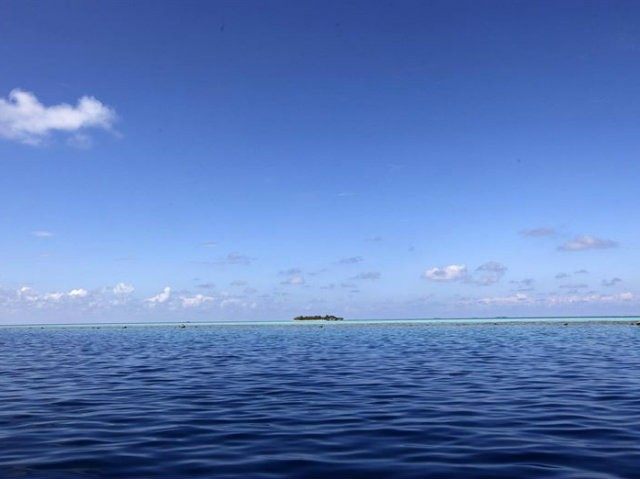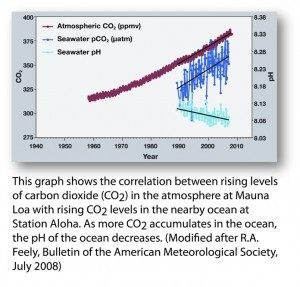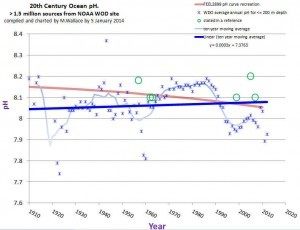Christmas has come a couple of days early for climate sceptics, in what may well prove to be one of the biggest blows to the Global Warming religion since Climategate.
This time the pillar of green faith which has been rudely dismantled by sceptical investigators is an alleged phenomenon known as “ocean acidification.”
For years this has been touted by environmentalists as possibly the greatest threat to the planet after “global warming.”
According to Jane Lubchenko, the head of the National Oceanic and Atmospheric Administration (NOAA), it is “climate change’s equally evil twin” because of the disastrous consequences it may have for everything from the navigational systems of spawning salmon to the health of coral reefs.
Ocean acidification is said to be caused when excess atmospheric carbon dioxide is absorbed by the sea, reducing its pH levels to make it more acidic.
But, as Watts Up With That reports new evidence unearthed by an inquisitive graduate student suggests that “ocean acidification” may be a scientific fraud to rank with the great “man-made-global warming” scare.
At the centre of the scandal is NOAA, the US federal scientific agency which measures and researches changes in the oceans and atmosphere, and which maintains one of the temperature datasets used to measure “global warming.”
One of NOAA’s departments – the Pacific Marine Environmental Laboratory (PMEL) – also happens to be one of the mainstays of the alarmist narrative about “ocean acidification.”
A 2004 paper by two of PMEL’s senior oceanographers – Dr Richard Feely and Dr Christopher Sabine – is often cited in support of “ocean acidification” theory and is reproduced, in simplified form, at NOAA’s website. It also formed part of testimony that Feely gave to Congress in 2010, again to the effect that increasing atmospheric CO2 is causing a reduction in seawater pH.
It warns:
“The impacts of ocean acidification on shelled organisms and other animals could negatively affect marine food webs, and, when combined with other climatic changes, could substantially alter the number, variety, and health of ocean wildlife. As humans continue to send more and more carbon dioxide into the oceans, the impacts on marine ecosystems will be direct and profound.”
and:
“The message is clear: excessive carbon dioxide poses a threat to the health of our oceans.”
However, it now seems that the paper’s certainty is at best misplaced, at worst outright dishonest. Not unlike Michael Mann’s discredited Hockey Stick graph it appears to depend on cherry-picked data and misleading projections in defiance of real-world evidence.
The alleged fraud was uncovered by Mike Wallace, a hydrologist with nearly 30 years’ experience now working towards his PhD at the University of New Mexico. While studying a chart produced by Feely and Sabine, apparently showing a strong correlation between rising atmospheric CO2 levels and falling oceanic pH levels, Wallace noticed that some key information had been omitted.
Mysteriously, the chart only began in 1988. But Wallace knew for a fact that there were oceanic pH measurements dating back to at least 100 years earlier and was puzzled that this solid data had been ignored, in favour of computer modelled projections.
When Wallace emailed his query to Feely and Sabine, however, he found them less than helpful.
Sabine replied that it was inappropriate for Wallace to impugn the “motives or quality of our science” and warned that if he continued in this manner “you will not last long in your career.” Having provided Wallace with a few links – all of which turned out to be useless – he concluded his email by saying “I hope you will refrain from contacting me again.”
This response, again, calls to mind the behaviour of Michael Mann in response to queries from Steve McIntyre about where to find the raw data for his Hockey Stick. Mann was similarly obfuscatory, rude and dismissive.
Undeterred, Wallace eventually got hold of the instrumental records which Feely and Sabine had chosen to exclude from their graph of doom and plotted a time series chart of his own, covering the period from 1910 to the present.
His results were surprising. What they suggest is that global acidification is a figment of Feely’s and Sabine’s imagination: there has been NO reduction in oceanic pH levels in the last century.
Wallace says: “Oceanic acidification may seem like a minor issue to some but, besides being wrong, it is a crucial leg to the entire narrative of ‘human-influenced climate change’.”
He adds: “In whose professional world is it acceptable to omit the majority of the data and also not disclose the omission to any other soul or Congressional body?”
For the background to the story, read Marita Noon’s full account at http://energymakesamericagreat.org/current-energy-commentary



COMMENTS
Please let us know if you're having issues with commenting.